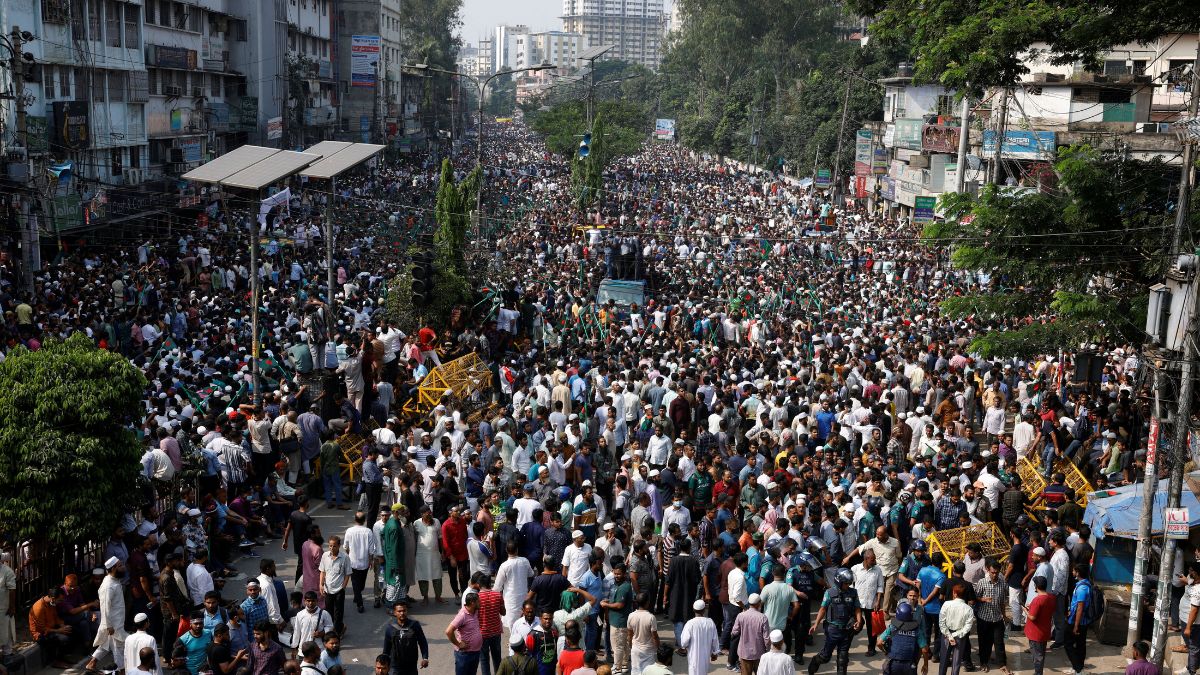Jamaat-e-Islami, the country’s largest Islamist party, was banned on August 1, just four days before the dramatic ouster of Prime Minister Sheikh Hasina. The party is now free to participate in public activities read more
)
Supporters of Bangladesh Jamaat-e-Islami occupy street of Matijheel to hold a rally in Dhaka, Bangladesh, October 28, 2023. File Image/Reuters
Bangladesh’s interim authorities on Wednesday (August 28) lifted a ban on the country’s largest Islamist party, Jamaat-e-Islami, which had been imposed during the final days of ousted Prime Minister Sheikh Hasina’s rule.
The government order, effective immediately, reverses the ban enacted on August 1, which barred the party from holding public gatherings.
Jamaat-e-Islami, with millions of supporters, had been banned from contesting elections since 2013 after a court ruled that its charter violated the secular constitution of the Muslim-majority nation.
The party was excluded from the 2014, 2018, and 2024 elections, with Hasina winning her fifth term in January amid accusations of a rigged and discredited electoral process with no real opposition.
Why was Jamaat banned?
In July, Hasina’s government accused opposition parties, including Jamaat-e-Islami, of hijacking student protests protests against a quota legislation in Bangladesh to create unrest. Obaidul Quader, the general secretary of Hasina’s ruling Awami League, stated at the time that the decision to ban Jamaat and its student wing, Islami Chhatra Shibir, was based on their “past and present activities.”
Just days before her ouster, Hasina’s administration officially banned Jamaat under an anti-terrorism law. The ban, however, was lifted by the interim government on Wednesday, citing “no specific evidence of involvement with terrorism and violence.” The order also restored Jamaat’s ability to hold public gatherings.
Forced disappearances being investigated
The interim government has also launched an investigation into hundreds of enforced disappearances allegedly carried out by security forces during Hasina’s tenure. Human Rights Watch reported last year that more than 600 enforced disappearances had occurred since Hasina came to power in 2009, with nearly 100 individuals still unaccounted for. Many of those detained were from Hasina’s rivals, including the Bangladesh Nationalist Party and Jamaat-e-Islami.
Jamaat-e-Islami remains one of Bangladesh’s major political forces, alongside the Bangladesh Nationalist Party. The future of Hasina’s once-dominant Awami League, however, is now uncertain following her dramatic exit from power.
With inputs from AFP

 3 weeks ago
7
3 weeks ago
7
)
)
)
)
)
)
)
)
)
)
)
)
)
)
)
)
)
)
)
)
)
)
)
)
)
 English (US) ·
English (US) ·